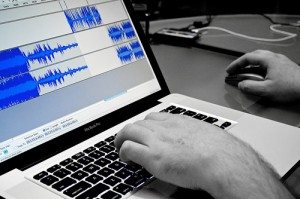 Reporting with sound isn’t just a technical challenge–it can raise ethical issues as well. How do you gather sound in the field and how do you use it? How much editing is okay?
Reporting with sound isn’t just a technical challenge–it can raise ethical issues as well. How do you gather sound in the field and how do you use it? How much editing is okay?
Guidelines like the RTDNA ethics code, which warns journalists not to “manipulate sound in any way that is misleading,” are a good starting point. But that general rule is open to interpretation and reasonable people may disagree.
A recent issue of News Photographer magazine quoted this sound advice from an ethics guide David Leeson developed for the Dallas Morning News:
Audio should always be presented in context. It is perfectly acceptable to edit out unwanted audio as long as the audio chosen for your story is used in proper context.
That leaves room for interpretation, of course, which isn’t such a bad thing. Maybe that’s why this set of guidelines on audio ethics from J-Source in Canada struck me as just a little too detailed in terms of what’s permissible.
- It’s okay, even expected, that you will cut out ums, ers, long pauses, and other examples of verbal stalling – unless their verbal stalling is key part of the story, as in the case of a politician ducking tough questions.
- It’s okay, even recommended, that you will cut out extraneous words.
- In other words, it’s okay to make edits that help someone sound sharper, tighter, clearer. It’s just NEVER okay to change the meaning of what they said.
Yes, technology makes it easy to cut stuff out, but heavy internal editing can raise questions of credibility, even if your motive is simply to make someone “sound sharper, tighter, clearer.” If the person just doesn’t talk that way, isn’t it misleading to make them sound on the air as if they do? Leeson again:
In general, subjects should be presented…’as they are.’ If your subject naturally uses a lot of ‘umms’ and ahhs’ while talking then it could be inappropriate to remove them and change their natural way of speaking. Use good judgment.
“Cleaning up” bites used to be common practice in some newsrooms to save time or to make stories flow better. But these days, when the same audio is often available from lots of different sources, it’s easy for listeners to compare an edited version to the original. And that’s bound to raise questions about why stuff was taken out.
Thoughts? Suggestions?









2 Comments
[…] Sourced from: NewsLab […]
[…] Sourced from: NewsLab […]